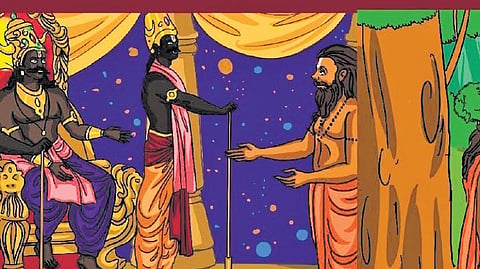

The Mahabharata tells the story of a Brahmin called Kausika who had taken a vow to always tell the truth. Once, when he was meditating in the forest, a young couple ran past him. Kausika noticed them. A little while later, a group of armed robbers came running. They stopped and asked Kausika which way the couple had escaped. Kausika understood the situation and the danger to the couple if he spoke the truth. Yet, due to his vow, he told the robbers. The robbers caught up with the couple and robbed and killed them. Kausika had to go to hell after death.
This is a curious situation where somebody went to hell for telling the truth. Would it have been better for Kausika to tell a lie? What about telling others to lie? For example, a parent might send their young child to ward off an unwelcome visitor at the door and tell a lie that they are not at home.
There are two views about always speaking the truth. One emphatically says yes. The German philosopher Immanuel Kant said that truth-telling is a “perfect duty” which cannot be overridden by other values like sparing someone’s life or their feelings. In this view, Kausika was obligated to tell the truth.
The other view says it is not always so black and white. The Mahabharata itself says:
Bhavet satyamvaktavyam na vyaktavyamanushthitam |
Satyanrite vinishchatya tato bhavati dharmavita ||
Words that are literally true need not necessarily be the truth; one needs to consider the effect of the words to determine if they are the truth or untruth.
Mahabharata further elaborates on what it means by the effect of the words:
Sarvasvasyapahaare tu vaktavyamanritam bhavet |
Tatranritam bhavet satyam chapyanritam bhavet ||
Tadrisham pashyate balo yasya satyamanushthitam |
If one’s everything is being threatened, one may resort to a lie to save oneself; in this situation, a lie has the effect of a truth, and a truth has the effect of a lie. Only a fool imagines that literal truth is required to be spoken under all circumstances.
In the prashnottar-ratna-malika, ascribed to Adi Shankaracharya among others, the following question-answers can be seen:
‘Who is not to be trusted?’
‘One who as a rule utters lies.’
‘On what occasions, even a lie is sinless?’
‘That which is uttered for the sake of protecting dharma.’
There are no easy answers to the moral dilemma of choosing between truth and lie in certain situations. If we do choose to tell a lie, we have to make sure we are doing it for a justifiable reason like preventing harm; not for our own convenience or benefit.